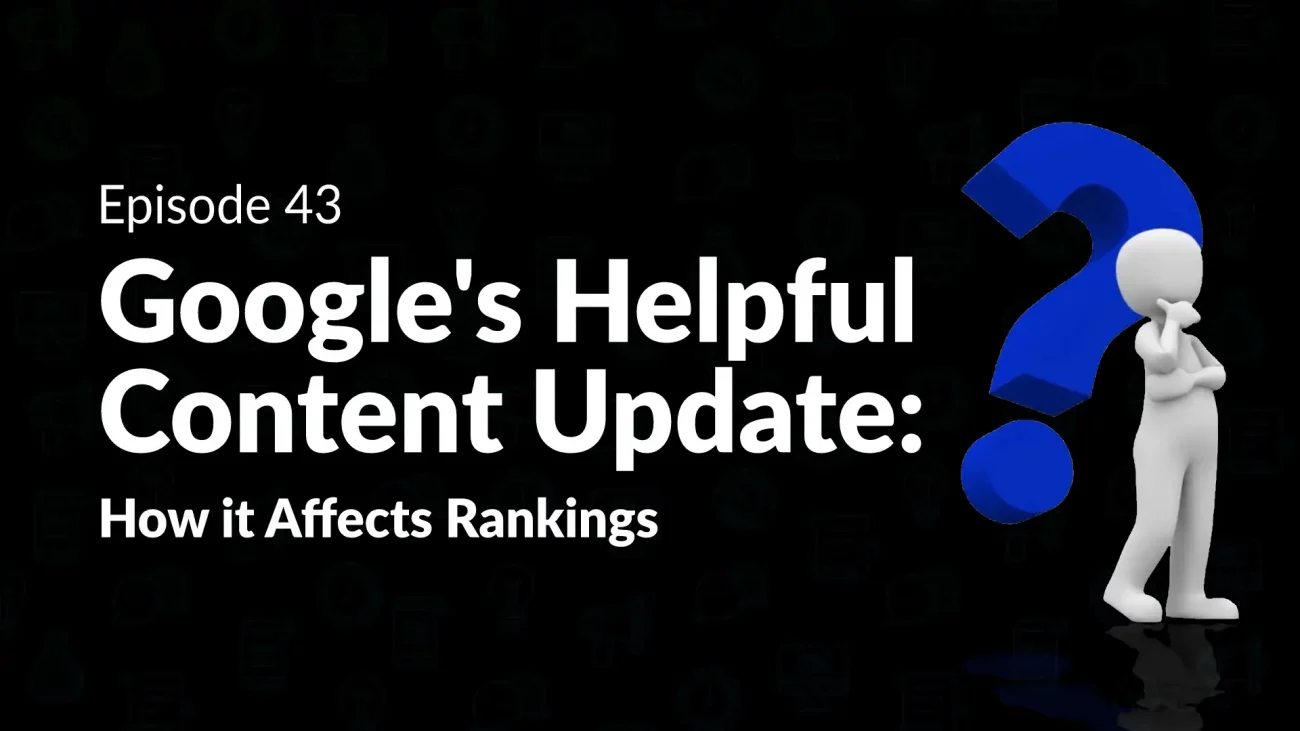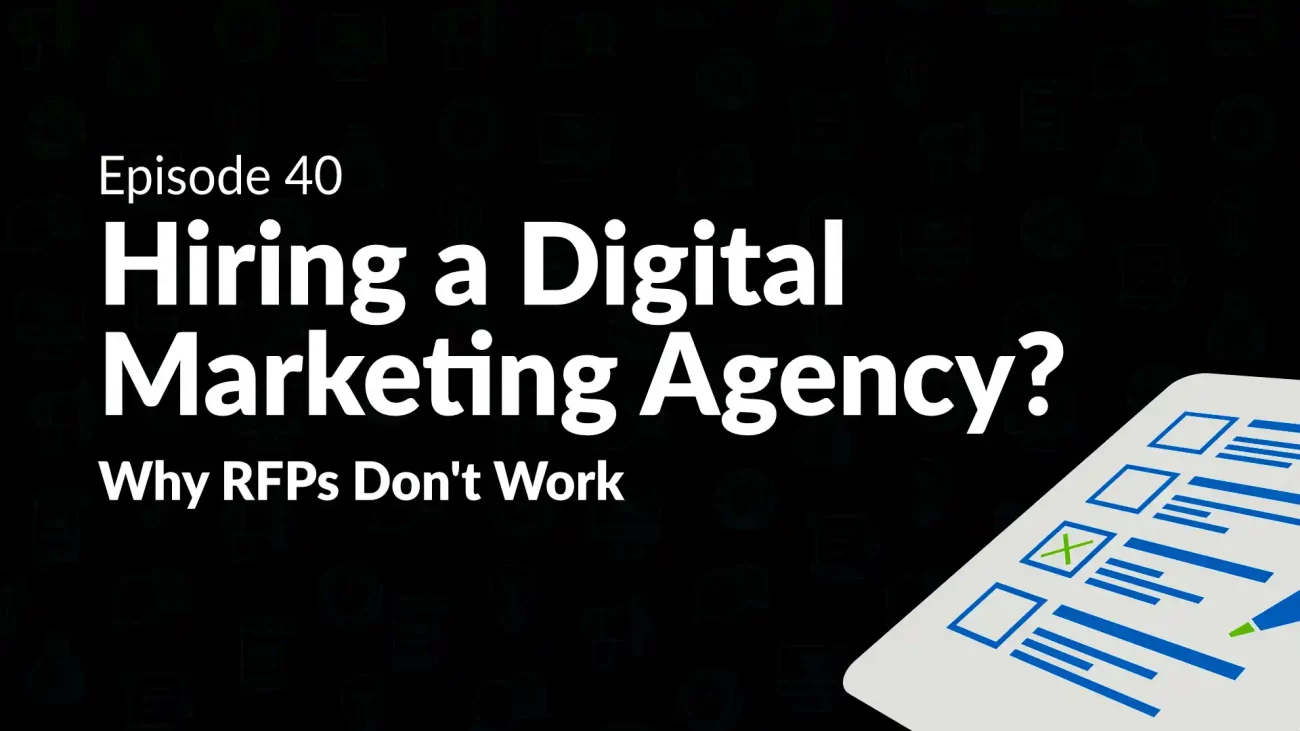Episode 33: Story Telling with Data: Make Your Data Actionable
All digital marketers agree that data collection is critical to measuring the success of any marketing effort. Data from your ad campaigns, SEO efforts, and traffic from your website visitors will help you better understand what’s going on. If this is where you stop, you are missing a big opportunity to use your data to make impactful improvements. The purpose of collecting data should be to tell a story about the results of your efforts. This story should be used to make your data actionable. Reports are too often littered with an overwhelming number of metrics that show performance but do little in terms of helping discover areas for improvement. Focusing on the key metrics that are able to indicate what is going well and what can be improved will not only simplify your reporting but will enable you to make continuous improvements to your campaigns.
In this week’s Digital Marketing Mondays Hans and Devin discuss how to make your data actionable and why that will benefit both the marketer and client.
Transcription:
Devin:
You’re listening to Digital Marketing Mondays. Each week, we bring you new and exciting content from around the marketing industry, and help give you, the marketer, insights into what’s happening. We’ll offer our advice and share some takeaways to help you develop better strategies for your marketing. Ideally, this will also help you improve your ROI as well. So with that, let’s tune into this week’s episode.
Hans:
Alright. Good morning, Devin.
Devin:
Good morning.
Hans:
Let’s talk about data, and the kind of data that comes to play in the digital marketing world. And the way I see it, there’s sort of three areas, and maybe you could kind of walk us through your thoughts on these. So when it comes to data, that is in terms of your campaigns that you’re running or your website or your emails or whatever it is that you’re doing, I guess the question is, are you collecting the right kinds of information? Because there’s a lot of data out there. And so the point is to hone in on what really matters: are you doing it accurately? Is your data accurate? Is it trustworthy? And then what’s that data telling you and what are you doing about it? So why don’t we talk a little bit, or why don’t you talk a little bit about sort of those three aspects.
Devin:
Yeah. And I think the first and foremost thing that people need to keep in mind here is that the entire purpose of having data is to help tell a story around what your activities are doing in terms of results. I think the other add-on to that, that I’ll dive into here in a minute is that once you have the story, the purpose is to then identify areas that can be improved, right?
Hans:
Mm-hmm.
Devin:
And continue to make improvements on those areas.
Hans:
Right.
Devin:
And so the story is that if you have a presentation deck for all of your digital marketing efforts that you pull together every single month, and you’re looking at 10,000 different metrics within that deck, I would argue that that’s probably a waste of time. I think the focus of any presentation for digital marketing really in this day and age should be, yes, what are your core metrics that tie to your business value, your business KPIs? But then in addition, I think the most important thing to focus on is, what are the metrics that are indicators that either something is going really well or something needs to be improved?
Hans:
Right.
Devin:
Those are really the only two things that matter here, to me anyways. Well, I guess three with the business KPIs. That seems to be lost to some respect in this day and age, because it’s one thing to just have a bunch of metrics and measure them all and show month over month improvement, but it’s another thing entirely to then take those metrics and say, “Okay, we know that these blog posts are getting less traction or they’re not ranking well for specific keywords that we want. What are we going to go do about it?
Hans:
Yeah. Right.
Devin:
That’s really what needs to be coming out of these types of presentations. Not as much, “Oh look, we’re ranking for X number of keywords now, whoop dee doo. Let’s go party.” That’s not the end of the story. Unless you’re at a finite point in which you can track that back to your business outcomes, and it’s continuing to produce outcomes on a regular interval, which I don’t think any marketing campaign has ever done ever in the history of time, except maybe an Apple campaign at one point… you need to be continuously asking yourself, “What is this data or what are these metrics doing for my business, and what do we need to do to make improvements?”
Hans:
Right.
Devin:
Because presumably, there always will be.
Hans:
Right. Yeah, no, I agree. I think at the end of the line, it’s the actions that you take and the results that those produce. That’s where the money is, right? Collecting the data and sifting through it and figuring it out, there’s no profit in that. You have to do it. It’s a step that you need to get to where you want to get to, which is to make those changes based on the information that you have that are going to generate more traffic, generate more leads, generate more conversions, increase sales, increase the size of your customer base.
Hans:
Those are the things that are your ultimate goals. And if you focus too much on the weeds, you’ll never really get there. I think you’re right. I think a lot of organizations we deal with, there’s this overarching emphasis on collecting more data, and is this really accurate and all? Yeah, it does have to be reasonably accurate. Right? And you do have to look at the right kinds of data, but at the end of the day, if you’re not using that to make actionable changes, then it’s a big waste of time.
Devin:
Absolutely. And I think to one other point, to an extent, I fundamentally believe that the exact accuracy of the data is slightly less important than that of actually what you do with that type of data? Obviously, you need to have accurate data in order to make an accurate estimate. But nine times out of 10, we run into clients all the time, that there are data accuracy issues that are cropping up, and there are also things that are outside of our marketer’s control. We are getting so much less data on Google Analytics these days. And why is that? It’s because of cookie blocking coming from Safari and iOS devices, right? And there’s going to be a lot more of that that’s going to continue to happen.
Hans:
Right.
Devin:
Even to an earlier episode where we talked about Apple’s mail privacy rollout that they’ve had, right? Where it now effectively scrambles your IP address, and you can automatically subscribe in one click or you can hide your email address. Crap like that. We’re just going to continue to see that privacy-centric thing creep into our world and make our data less reliable. And so I think we’re at a point, yes, it’s obviously important to have reasonably accurate data, but you can still make assumptions, or you can still create action plans based on the data that you have, whether you’re within a couple percentage points of accuracy, I’m far less worried about that than I am about, what’s the story? What is this telling you?
Hans:
Right.
Devin:
And what can you do about it? And I think I’ll put a challenge out there to folks. I think if you have some executive presentation that you’re putting out every month that talks about, what’s your web performance, what’s your demand performance, what’s your email performance, right? I bet you could report on each of those sections with three metrics or less to tell a really, really compelling story. Cut out the number of metrics that you’re looking at and focus on, what are the metrics that are telling us how things are doing or actions that we need to take.
Hans:
Right.
Devin:
And not all of them are directly correlated as well. Or, not all of them are necessarily directly impacted by activities that you do. As an example, if your bounce rate suddenly goes from 60% or 70% down to zero, that’s a story that there’s something technically wrong on your website that needs to get addressed. And that’s a story, right? There’s no other way that you can sugarcoat that. That’s a technical issue that needs to be taken care of. Or you saw in your emails, you had a 2% unsubscribe rate. Well, there’s probably a reason why that actually happened, right? Maybe you sent out the email to a bad list of people, or maybe it was an automated email that was going out to folks where maybe they shouldn’t have been getting that email. So it caused a lot of [inaudible 00:06:47].
Hans:
You didn’t segment your list enough or something like that, right?
Devin:
You didn’t segment your list enough, right? There could be a number of reasons why certain data takes place. Or, hey, you got five X more conversions than normal. What did you do? You launched a new campaign with a new look and feel, new call to action, right? Look at that. Now you can iterate on that or continue to improve in that direction. So I guess that’s my challenge for folks. Think about, what are the metrics that will tell the most compelling story? And then focus on reporting on that. Let’s not focus on the number of metrics that we’re actually looking at or to an extent whether obviously they should be reasonably accurate, but we’re not looking for 100% perfect accuracy here. We’re looking for, what do those metrics tell us?
Hans:
Yeah, yeah, good. All right. Good one. I think that’s a great life lesson here. Focus on the bottom line and the stuff that’s really going to move the needles in a real way, in terms of results and financial improvements, rather than just what is going on. So, good. Good one. Thanks, Devin.
Devin:
Yes. Thank you. Have a good one.
Hans:
All right. Take care.
Devin:
Thank you so much for tuning in. We really appreciate you taking the time out of your busy day to engage with our content. Whether you’re watching on YouTube or subscribed on our podcast apps, we appreciate you taking the time. Make sure to leave a comment down below and let us know any feedback that you have for us. We’re always watching the comments and engaging in any way that we can. So if you find this content useful, also make sure to subscribe or give it a big thumbs up. We appreciate it. Thanks so much.









